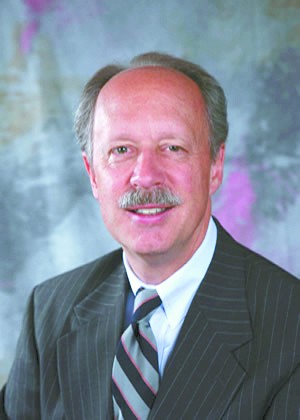University: no plans to expand doctoral programs

Courtesy Photo/ gvsu.edu Matt McLogan is the Vice President of Public Relations for Grand Valley.
Nov 21, 2011
While Grand Valley State University officials continue the struggle to obtain more state funding, some in Lansing believe Michigan lawmakers might receive the plea more openly if the university expanded into a research and doctorate level institution.
“If (GVSU) moved to a doctorate university and a research university, it will put them on a higher level on the food chain of funding,” said Ed Kettle, senior legislative aide to Rep. Roy Schmidt, D-Grand Rapids.
Matt McLogan, vice president of university relations at GVSU, said administrators are not considering developing more doctoral programs at this time.
“President (Thomas J.) Haas and Provost (Gayle) Davis have said they think Grand Valley is best suited to remain in its current classification of ‘master’s large,’” McLogan said. “Grand Valley offers a rich liberal arts undergraduate experience, master’s degrees – most of which are professional in nature – and clinical doctorates in physical therapy and nursing practice.”
Davis said doctorate programs are already abundant in the state, so adding more at GVSU would be redundant. “The niche that we have (as an undergraduate and master’s institution) is meeting a real need in Michigan,” she said.
She added that GVSU’s close proximity to competitive doctoral institutions like Michigan State University and the University of Michigan would not be in the university’s favor if it were to become a doctorate-granting institution.
Jeffrey Potteiger, dean of graduate studies, said GVSU is not even close to being prepared to compete with the larger schools that offer doctorate programs.
“We’re almost as far away from that model as we could possibly be,” Potteiger said. “(Competing) would not be, in my mind, easily doable, if it’s doable at all.”
He said the development of doctorate programs is not within the university’s current financial capacity and would contradict the purpose of the institution.
“I don’t think Grand Valley has the resources nor do we want to do that,” he said. “That’s not within our mission nor our strategic plan.”
Davis added that the enterprise would be costly and may not be financially valuable overall.
“Having more money from the state if we moved to the next level would still not help us in any particular way in terms of bridging the funding gap Grand Valley experiences,” she said. “There might be some extra funding if we were a different kind of institution, but then we would have added extremely expensive programs at the Ph.D level to support.”
In other words, the extra government funding would only offset the cost of maintaining the doctoral studies.
Many professors have already begun discussing among themselves the advantages and disadvantages of offering more graduate-level programs. Professor Sheldon Kopperl, who has been teaching history, biomedical sciences and liberal studies for 41 years at GVSU, said he and many of his colleagues would prefer the university remain focused on providing an undergraduate education.
“I’m worried about what that emphasis on Ph.D education is going to do to our undergraduate quality,” Kopperl said. “Faculty, instead of meeting with students in their undergraduate classes, will be busy writing grant proposals to bring in more money and be busy mentoring their graduate students.”
The professor said he thinks undergraduate students would not get the same quality of education from graduate-student teaching assistants as they would from professors if the university made the switch.
“There’s something about having the instruction from full-time faculty that’s a lot better,” Kopperl said.
He added that another major concern is research. Not only would undergraduate students lose research opportunities to graduate students, but Kopperl said GVSU just does not have the resources to offer full-fledged graduate-level research.
“Right now, I don’t think Grand Valley is set up to do Ph.D-type research, especially in the sciences,” he said. “There’s talk about a new science building where research facilities can be improved, but we just don’t have the dollars or the space or the time commitments. We aren’t going to be able to attract the big-name faculty to get the research grants until that kind of stuff is available.”
Although Kopperl would prefer to keep GVSU an undergraduate-focused institution, he said professors would benefit from the prestige, travel opportunities and reduced teaching loads that come with doctoral programs.
He also posed the argument that the university would receive more money from non-government granting agencies if it became more research-centric.
McLogan said though the university does not plan to develop a doctorate program any time soon, they are prepared to enhance its research capacity.
“Research opportunities for students, both graduate and undergraduate, are available, are an important part of our academic program, and will likely increase in the future,” he said.
However, expansion of research programs may not be necessary for GVSU to receive more appropriations.
“I appreciate Ed Kettle’s observation that research universities presently receive higher per-student funding from the state,” McLogan said. “But it is not clear to me that this will remain the case, as Gov. Snyder and members of the legislature are presently exploring new funding models for universities.”
Nothing has yet been confirmed about a new model, but university officials anticipate a proposal in the next state budget.






















